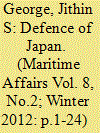| Srl | Item |
| 1 |
ID:
154794


|
|
|
|
|
| Summary/Abstract |
China’s rise as a (re)emerging donor has attracted attention over the last decade, with a focus on Chinese development assistance as a challenge to the Organisation for Economic Cooperation and Development (OECD) aid norms. Knowledge of China’s domestic aid structure is needed to understand Chinese aid abroad. This paper addresses gaps in the literature and challenges the accepted nostrum that China’s Ministry of Commerce (MOFCOM) dominates China’s aid programme. Building on the authors’ experience as Chinese aid practitioners and scholars over more than a decade and drawing on over 300 interviews, the paper explores China’s aid decision-making processes by examining the main agencies, identities and informal interactions. We argue that the Chinese aid system is characterised by fierce and ongoing competition for influence among actors, especially MOFCOM, the Ministry of Foreign Affairs (MFA) and the Ministry of Finance (MoF), as well as the companies responsible for implementing Chinese aid projects.
|
|
|
|
|
|
|
|
|
|
|
|
|
|
|
|
| 2 |
ID:
117145


|
|
|
|
|
| Publication |
2012.
|
| Summary/Abstract |
Security and defence issues in Japan are still considered to be a topic which induces debate and controversies. Defence forces and actors are submerged under myriad layers of civilian control; as a result the voice of military is often muzzled. Since the 1990s, the levers of control are shifting, muted military expressions are becoming clear, and the civilian administration too understands the need for a realistic outlook on security matters. This change does not insinuate that Japan is going back to remilitarisation way of the 1930s. Bequeathed with robust democratic structures since World War II, Japanese defence decision-making follows a certain pattern and trend. Many studies in English have examined Japan's economic, trade, and security policies, while Japan's defence decision-making has not been analysed. In recognising this neglect, this study focuses on the defence decision-making process from the decision-makers points of view. This study will aim to clear some doubts over the Japanese decision-making process opaqueness.
|
|
|
|
|
|
|
|
|
|
|
|
|
|
|
|